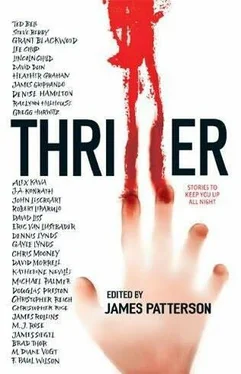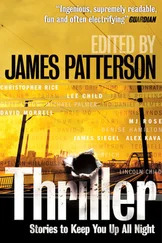The place turned out to be a small room on the second floor above a dark bookshop owned by an old Coptic Christian widow with patriotic slogans in her window. The peddler himself let them in, had a room of his own on the first floor where he had lived for over a year.
"It's as safe as anything can be here," the peddler said, and left them alone in the tiny room with its one bed and some chairs and a cabinet they could barely see. There was no light.
They didn't need a light. After they had made love once more, Hareet held her close against him for the rest of the night as if to build a wall of protection that would keep her safe. He was not a demonstrative man; Greta knew he was afraid for what could happen to her, to them, when the night ended.
The guards paced at the gates in the outer wall of Army General Staff Headquarters far out on the edge of the city. They looked up as they walked their posts to watch their jets fly high above in beautiful formation. The ragged people on the streets cheered the jets and the guards as they shuffled past the front gates.
Among the throngs of people that passed the gates was a tall, dark-skinned man with a pointed beard, thick glasses and a fez. He walked purposefully, with an arrogant bearing. With the tas-seled fez he wore a dark Western suit and immaculate pale kid gloves. The crowds of fellahin gave him respectful room as he strode around and through them.
Hareet, in the dark makeup and wearing the gloves to conceal his missing finger, turned into a side street at the corner of the wall and proceeded on his inspection of the headquarters building. The side wall was broken by only another high wooden gate, locked on the inside and outside. In the rear, the wall stretched without a break, and on the fourth side there was only a narrow, barred gate, also locked on the inside and outside and patrolled by a guard.
The building inside the high stone wall was from the last century and only two stories high. The roof had a steep pitch, and the windows of the upper floor were barred and shuttered. Two armored cars slowly patrolled the street all around the building, moving in opposite directions.
Hareet, his study completed, walked to a house a few blocks from the headquarters, and there changed into the flowing and ragged burnoose of an Arab country. He removed the fez and glasses, replaced the fez with a keffiyeh, and rearranged his false beard. He strapped his left arm to his side, and assumed a limp in his left leg.
A crippled fellahin was too common a sight in the streets of the city for anyone to look at twice. The fellahin limped his way to a filthy alley that paralleled the street in front of staff headquarters, and entered the rear of a building. He climbed to the second floor and slipped into an empty room at the front. He locked the door behind him, crossed quickly and without a limp to the front window with its clear view of the guarded gate into the headquarters.
Hareet sat in a chair some three feet inside the window so that no sun would glint on the powerful binoculars he took from beneath his burnoose. He sat on the chair for six hours without moving, except to rest his eyes now and then, and to light a cigarette. He scrutinized the building, and the officers who went in and out.
Late in the afternoon, a slight scratching came at the door of the room. Hareet listened from his chair. The scratching was repeated in a definite pattern. He opened the door. The peddler came in.
"Have you found your man, Captain?"
"A colonel of artillery," Hareet said. "He looks enough like me to pass. He's in there right now. He is arrogant, the soldiers do not seem to like him, and he drives himself. His vehicle indicates that he is a field commander, not a staff officer. He is unusually tall, has slightly Sudanese features, wears a monocle and strides much as I do. He also wears gloves. He carries a swagger stick and is annoyed at having to present credentials every time he goes in or out of the front gate. When does the guard change?"
"In an hour."
"Where are all the supply, fuel and ammunition depot documents we need?"
"In a small vault. It's an old key-locked type left by the British. With all other precautions supplied by their more modern friends, they don't feel a need to spend what a new vault would cost. It won't be hard to open, and it's located in a file room connected to the office of the chief of supply. They may work around the clock tonight."
"No, not an Arab army. They will be in conferences or with their mistresses. Come."
Hareet and the peddler left the room, and went down to the alley. Greta stood in the shadows of the alley dressed as a street boy.
Hareet described the colonel of artillery. "Watch for him. If he comes out, don't lose him."
Hareet and the peddler returned to the building a few blocks away where Hareet had changed from the gentleman in the fez to the crippled fellahin. There the peddler opened a large dossier, and Hareet found the picture and official history and designations of the artillery colonel he had seen go in and out the main gate of General Staff Headquarters.
The peddler read the details. "Colonel Aziz Ramdi. Forty-two years old. Unmarried. Sudanese mother. No foreign posts or training, no staff time, but many commendations for bravery in the last war with us. Commander of the Hundred and Twelfth Field Artillery. They're part of the city defense. Only recently transferred to the city from service on the southern border. He hasn't had the plum positions, doesn't sound like he's made any good connections. Probably because of that Sudanese mother. Hard to say how well-known he could be at staff headquarters."
"I won't need long," Hareet said. "It's reasonable to assume that a line officer who's been out in the field and far from the capital won't be all that familiar to the staff here. He's my best chance, we don't have a lot more time."
The peddler nodded, and with the picture of the artillery colonel in front of him, Hareet worked on his face until he looked as much like Colonel Aziz Ramdi of the Hundred and Twelfth Field Artillery as he could.
"The film could be shot over the wall from a top window," the peddler said. "I have the equipment."
"They would know," Hareet said.
"You could copy and not photograph, then the light would not sensitize the chemicals on the documents."
"There would not be time. I would have to touch the papers. The data must be secured without their knowing that we have it," Hareet emphasized.
Hareet completed his disguise. With the peddler shuffling far enough ahead of him that they could not be considered in any way together, he walked back to the alley and the room across from the headquarters. It had grown dark in the city, and large floodlights illuminated the headquarters wall and building.
"He is still inside," Greta said from the shadows of the alley.
An hour later, the colonel of artillery came out, got into his
Jeep and impatiently presented his credentials at the front gate. He drove off to the left and made a right turn onto a narrow street that was the direct route to his unit.
A fellahin woman dashed out of the shadows directly into the path of his Jeep. A ragged peddler pursued her. The peddler caught the woman in the street in front of the colonel's Jeep, struggled with her amid a torrent of loud screams and curses. Ramdi jammed on his brakes, and added his own curses to the loud Arabic.
The colonel barely felt his Jeep sway as someone jumped into it behind him. His pistol was still under its flap when the thin cord tightened around his throat.
Colonel Aziz Ramdi glared angrily at the officer of the guard at the gate into headquarters. The officer of the guard was nervous as he inspected the colonel's credentials. Only fifteen minutes ago he had checked the colonel out, and he felt ridiculous going through the entire routine again, but he knew he would have been even more nervous if he hadn't. In an Arab army, independent thought and decisions are not encouraged. Another weakness Hareet had exploited before.
Читать дальше












